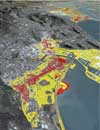 This year’s NZ Climate Change Centre conference, to be held at Te Papa in Wellington next month, focusses on sea level rise, and how communities can adapt to the inevitable encroachment of the ocean. The organisers have laid on some excellent speakers, include Aussie oceanographer and sea level expert John Church, as well as many directly involved with the issues raised by sea level rise in New Zealand. The conference programme aims to:
This year’s NZ Climate Change Centre conference, to be held at Te Papa in Wellington next month, focusses on sea level rise, and how communities can adapt to the inevitable encroachment of the ocean. The organisers have laid on some excellent speakers, include Aussie oceanographer and sea level expert John Church, as well as many directly involved with the issues raised by sea level rise in New Zealand. The conference programme aims to:
- Present the latest science of sea-level rise associated with climate change, including the role of polar ice-sheet melt
- Present a synthesis of recent projections for sea-level rise and discuss the uncertainties associated with these projections
- Identify anticipated impacts on New Zealand coastal environment and infrastructure resulting from climate change
- Discuss whether adaptive risk management for adapting to sea-level rise will be adequate given the ranges projected and their uncertainties
- Stimulate discussion of how end-users can manage present and future coastal issues and how social and bio-physical scientists, central and local government, and infrastructure operators can work together with communities to build resilient systems
- Describe approaches that have been taken to planning coastal futures, which take into account community and resource-user needs underpinned by plausible climate change projections, adaptive approaches to manage uncertainties, and sound approaches to developing coastal policies.
Sounds like a very worthwhile couple of days. It’ll be interesting to hear what the “synthesis of recent projections for sea-level rise” suggests we’re in for, so if any HT readers are planning to attend, I’d be very happy to carry some conference reports.
For what it’s worth, in my view two numbers and one uncomfortable fact are of prime importance. We’re committed to warming, and therefore to sea level rise. The peak level of atmospheric CO2 that we reach (unless we can cut it very quickly after the peak by active carbon removal) will set the final quantum of sea level rise the planet will experience. The latest paleoclimate evidence suggests that current CO2 levels are putting us on course for an eventual 20 metres of sea level rise. Pick your final CO2 concentration, and calibrate against times past. At 300 ppm in the last interglacial, sea level was 6 metres higher than present.
The consequence of where we end up on the atmospheric carbon scale is a long term inevitable and uncomfortable commitment to continuously increasing sea level. It might be enough for some purposes to consider only a metre or two over the the next century, but if you’re planning to rebuild a city, perhaps you should look a little further ahead. Fascinating discussions are in store in Wellington, I confidently predict…
I was lucky enough to attend (and speak) at last year’s conference ((The proceedings of last year’s forum are now available from the NZ CCRI.)), and I’m sure that this year’s effort will be just as worthwhile.
[Zep]

 A couple of weeks ago I plugged an
A couple of weeks ago I plugged an 
